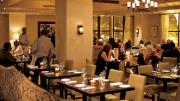Those looking for reliably good, rich French food in a tasteful milieu would do well to dine at Bistro du Midi this winter. The well-designed lighting is a combination of low and sparkling—flattering and festive. And diners facing the large windows on one wall are treated to pretty views of trees and the Public Garden.
Try to sit near the fireplace: it warms what can, despite the luminance and comfy upholstered chairs, feel like an impersonal space. Cream-colored walls prevail, accented by innocuous art and, in one spot, a row of empty colored-glass vases. Nothing lends much character, although all is certainly handsomely “high end.” Perhaps the sense of restraint came more from the crowd the night we were there: nice enough, but a bit buttoned-up. Some might have benefited from another glass of excellent wine chosen from the 26-page, hardbound list.
If a more lively, casual mood is desired post-shopping or matinées, eat at the bar or café on the first floor, once home to the Boston favorite Biba. The café is open all day with a very good menu of its own: the classic croque-monsieur ($13), for example, and the not-to-be-missed French fries (more on those later). The full restaurant menu is also available at the bar after 5 p.m.
Upstairs, the delicious, fresh salad of marinated golden and red beets (tender bites) started off the night with balls of tangy Vermont goat cheese and frisée, all dressed in a light lemon vinaigrette ($12). We spread the cheese on spongy white bread that came in a small bucket, along with foot-long rosemary-laced breadsticks. The crostini with Kalamata olive tapenade and artichoke dips ($9) tasted good, as expected, but was nothing unusual. We did fall in love with the perfectly crispy thin French fries, however, spiced with nuanced Espelette pepper powder (from the Basque region) and accompanied by a yummy pimento aïoli ($7).
The fries, beet salad, and the duck entrée ($31) were clear standouts. A generous portion of juicy seared duck breast came with soft triangles of house-made potato gnocchi and nicely salted sautéed spinach, all in a lavender-enhanced jus (just the right arid sweetness) with a sprinkling of toasted hazelnuts and pea tendrils on top. The tagliatelle ($26) was served in a small, deep bowl that looked as if it were meant for a child well-enough behaved to land a fancy dinner with her parents. It had a handful of mussels in the shell, some calamari, and a small amount of chopped-up sea beans: green stalks with a briny flavor that looked like a cross between leggy seaweed and asparagus. The dish had too much fat (cream or butter), a dearth of seafood, and was not worth the price.
Here it must also be added that we found the waitress pushy. She pointedly asked if we’d like more side dishes after we’d already ordered two starters, two entrées, the fries, and the special Grand Marnier soufflé she had recommended. The check was also put on the table before we’d even started dessert, with a gratuitous, “But take your time.” (The many busmen, by contrast, were relaxed and friendly.)
The soufflé ($10) was more like a custard than a cake, but expertly made, as was the citrusy sauce: both predictably delicious. Bistro du Midi is a fine dining spot, no doubt. It was our fault for anticipating something more au courant.










